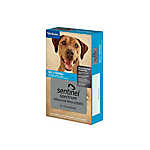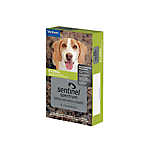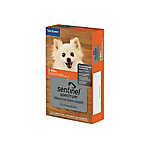About this item
Usage: *For complete product information, please review the full prescribing information in the manufacturer package insert. Manufacturer Dosage and Administration: SENTINEL SPECTRUM Chews should be administered orally, once every month, at the minimum dosage of 0.23 mg⁄lb (0.5 mg⁄kg) milbemycin oxime, 4.55 mg⁄lb (10 mg⁄kg) lufenuron, and 2.28 mg⁄lb (5 mg⁄kg) praziquantel. For heartworm prevention, give once monthly for at least 6 months after exposure to mosquitoes. To ensure adequate absorption, always administer SENTINEL SPECTRUM Chews to dogs immediately after or in conjunction with a normal meal. SENTINEL SPECTRUM Chews may be offered to the dog by hand or added to a small amount of dog food. The chewables should be administered in a manner that encourages the dog to chew, rather than to swallow without chewing. Chewables may be broken into pieces and fed to dogs that normally swallow treats whole. Care should be taken that the dog consumes the complete dose, and treated animals should be observed a few minutes after administration to ensure that no part of the dose is lost or rejected. If it is suspected that any of the dose has been lost, redosing is recommended.
Missed Doses: If a doseis missed: give SENTINEL SPECTRUM immediately to resume monthly dosing and notify your veterinarian. Do not give two doses at once. If multiple doses have been missed, consult your veterinarian prior to restarting the monthly dosing schedule.
Side Effects: SENTINEL SPECTRUM is generally well tolerated, and side effects are considered uncommon when given at the recommended dosage. Reported side effects include (but may not be limited to) vomiting, depression⁄lethargy, itching, skin reactions (e.g., redness, rash), diarrhea, decreased appetite, decreased coordination, salivation⁄drooling, and weakness. Contact your veterinarian immediately if your pet experiences a shock-like reaction, severe or persistent vomiting, fainting⁄collapse, or if you notice your pet has a seizure, extreme weakness⁄tiredness, dilated pupils, or severely decreased coordination (e.g., stumbling, difficulty walking). Notify your veterinarian if your pet experiences any of the effects described above, or if you notice any other side effects that are persistent or troublesome. If you notice anything unusual, please consult your veterinarian.
Precautions: *For complete product information including warnings and precautions, please refer to the manufacturer package insert. For oral use in dogs only- not for use in humans. Keep this and all drugs out of the reach of children. Treatment with fewer than 6 monthly doses after the last exposure to mosquitoes may not provide complete heartworm prevention. Prior to administration of SENTINEL SPECTRUM Chews, dogs should be tested for existing heartworm infections. At the discretion of the veterinarian, infected dogs should be treated to remove adult heartworms. SENTINEL SPECTRUM Chews are not effective against adultD. immitis. Mild, transient hypersensitivity reactions, such as labored breathing, vomiting, hypersalivation, and lethargy have been noted in some dogs treated with milbemycin oxime carrying a high number of circulating microfilariae. These reactions are presumably caused by release of protein from dead or dying microfilariae. Do not use in puppies less than six weeks of age. Do not use in dogs or puppies less than two pounds of body weight. The safety of SENTINEL SPECTRUM Chews has not been evaluated in dogs used for breeding or in lactating females. Studies have been performed with milbemycin oxime and lufenuron alone. Discuss the risks of using this medication with your veterinarian prior to use in animals used for breeding, or those that are pregnant or nursing. Do not administer to animals with a known history or suspected allergy⁄hypersensitivity to this medication or any of its ingredients. Allergic reactions to medications may occur. Be sure to inform Vetsource and your veterinarian if your pet has any known drug sensitivities or allergies. If your pet displays symptoms of an allergic reaction, discontinue therapy and call your veterinarian immediately or seek emergency veterinary attention. Symptoms may include (but are not limited to): swollen lips, tongue, face, or airways; difficulty breathing; agitation; profuse salivation; and widespread hives or itching.
Drug & Food Interactions: The following drugs* may have potential interactions with this medication: amiodarone, azole antifungals (e.g., itraconazole, ketoconazole), certain calcium channel blockers (e.g., diltiazem, verapamil), carvedilol, cyclosporine, dexamethasone, macrolide antibiotics (e.g., erythromycin), and phenobarbital. *NOTE: this may not be a comprehensive list. Contact your veterinarian if your pet experiences any unusual reactions when different medications are given together. Please ensure your veterinarian is aware of all medications and supplements that your pet is currently receiving. Your veterinarian may prescribe multiple medications, even if a potential drug interaction may occur. In these instances, your veterinarian may adjust the dosages or monito


















